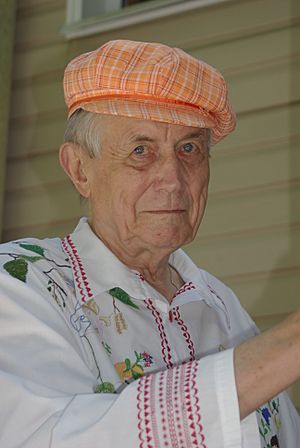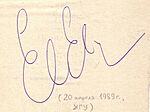Yevgeny Yevtushenko facts for kids
Quick facts for kids
Yevgeny Yevtushenko
|
|
|---|---|

Yevtushenko at the opening of his museum at Peredelkino, July 7, 2010
|
|
| Born | Yevgeny Aleksandrovich Gangnus 18 July 1933 Zima, Irkutsk Oblast, Russian SFSR, Soviet Union |
| Died | 1 April 2017 (aged 83) Tulsa, Oklahoma, US |
| Occupation |
|
| Nationality |
|
| Period | 1949–2017 |
| Notable works | Babi Yar |
| Children | 5, including Sasha |
| Signature | |
 |
|
Yevgeny Aleksandrovich Yevtushenko (Russian: Евге́ний Алекса́ндрович Евтуше́нко; 18 July 1933 – 1 April 2017) was a famous Soviet and Russian poet. He was also a writer, film director, publisher, actor, and university professor. He wrote many poems, novels, and screenplays during his life.
Contents
About Yevgeny Yevtushenko
His Early Life and Family
Yevgeny Yevtushenko was born on July 18, 1933, in a small town called Zima in Siberia, Russia. His birth name was Yevgeny Aleksandrovich Gangnus, but he later used his mother's last name, Yevtushenko. His family had roots from different places, including Russia, Germany, Ukraine, Poland, Belarus, and Tatar.
His grandfathers were both arrested in 1937 during a difficult time in Soviet history. Yevgeny's father, Aleksandr, was a geologist, and his mother, Zinaida, was also a geologist who later became a singer. Yevgeny often went with his father on trips for geology work.
He started writing poems and funny songs when he was young. His parents divorced when he was seven, and his mother raised him. By age 10, he had written his first poem. When he was 16, a sports magazine published his poetry. At 19, his first book of poems, The Prospects of the Future, was published.
Becoming a Poet
After World War II, Yevtushenko moved to Moscow. From 1951 to 1954, he studied at the Gorky Institute of Literature. In 1952, he joined the Union of Soviet Writers after his first poetry collection came out. One of his early poems became a very popular song.
In 1957, he was asked to leave the Literary Institute because he was seen as too "individual." He was sometimes called "the leader of young rebels" and was not allowed to travel outside the country for a while. However, he became very popular with people in the Soviet Union. Famous poets like Boris Pasternak also praised his early work.
During a Time of Change
Yevtushenko was an important writer during a period known as the Khrushchev Thaw. This was a time when the Soviet Union became a bit more open after the strict rule of Joseph Stalin.
In 1961, Yevtushenko wrote his most famous poem, Babiyy Yar. This poem spoke out against how the Soviet government ignored the massacre of Jewish people by the Nazis in Kyiv in 1941. It also talked about anti-Jewish feelings that were still present in the Soviet Union. The poem was published in a major newspaper and became very well known. Later, the famous composer Dmitri Shostakovich used this poem and four others by Yevtushenko in his Thirteenth Symphony.
In 1962, Yevtushenko wrote Nasledniki Stalina (The Heirs of Stalin). In this poem, he said that even though Stalin was gone, his harsh ideas (Stalinism) still affected the country. He asked the Soviet government to make sure Stalin's ideas would "never rise again." This poem was first published in the newspaper Pravda.
In 1963, he traveled to West Germany and France. While in Paris, he published his autobiography, which caused some trouble in Moscow. He was told to return home and was not allowed to travel abroad for several years.
Yevtushenko became one of the most recognized poets in the Soviet Union during the 1950s and 1960s. He was part of a generation of young, active writers and artists. Some people admired him for speaking out against the government, while others felt he was too careful or too close to the authorities. Despite some criticism, he was nominated for the Nobel Prize in Literature in 1963 for his poem "Babi Yar."
His Work in Films
Yevtushenko appeared in films as a performing poet. He wrote songs for several Soviet movies. He also helped write the script for Soy Cuba (I Am Cuba, 1964), a Soviet film.
He started acting in 1979, playing the main role of rocket scientist Konstantin Tsiolkovsky in the film Vzlyot (Take-Off). Yevtushenko also directed two of his own films: Detsky Sad (Kindergarten, 1983) and Pokhorony Stalina (Stalin's Funeral, 1990). Both films showed life in the Soviet Union.
After the Soviet Union Ended
In 1989, Yevtushenko was chosen to be a representative in the Soviet Parliament. He was part of a group that supported democratic changes and Mikhail Gorbachev. In 1991, he supported Boris Yeltsin during a time when some hardline communists tried to take over the government. However, he later disagreed with Yeltsin when tanks were sent into Chechnya.
After the Soviet Union broke up, Yevtushenko spoke out about environmental issues. He also worked to make sure people remembered the victims of Stalin's harsh labor camps, known as the Gulag. In 1995, he published a large collection of modern Russian poetry.
Teaching and Traveling in the West
After 2007, Yevtushenko spent his time between Russia and the United States. He taught Russian and European poetry, and the history of world cinema, at universities like the University of Tulsa in Oklahoma and Queens College in New York. He enjoyed teaching students who were connected to nature and were very talented.
In the West, he was known for speaking against the Soviet government's strict rules and for wanting to move past Stalin's legacy. He was working on a collection of Russian poetry and a novel about his time in Havana during the Cuban Missile Crisis. He was also friends with famous people like Che Guevara and Pablo Neruda.
In 2007, he recited his poem Babi Yar before a performance of Shostakovich's Thirteenth Symphony at the University of Maryland. The first time these two works were performed together with Yevtushenko present was in 1998 at the University of Houston.
Different Views on His Work
People had different opinions about Yevtushenko's role as a writer. Some saw him as a brave voice who spoke out against the government's problems. They believed he helped prepare the way for reforms in the Soviet Union. For example, he was one of the first to speak against Stalin's harsh rule. He also refused to join in the official criticism of Boris Pasternak and his novel Doctor Zhivago. He spoke out against the Soviet invasion of Czechoslovakia in 1968 and the war in Afghanistan in 1979. He even tried to help other writers who were in trouble.
However, some critics felt he was too willing to work with the government. They thought he only spoke out when it was "officially approved." They believed he was not as strong a "dissident" (someone who strongly opposes the government) as others like Aleksandr Solzhenitsyn. Despite these different views, many people in the West and many Russian scholars considered him a very important writer of his time. They admired his dramatic readings and powerful personality.
Personal Life and Passing
Yevtushenko was married four times. His first wife was the poet Bella Akhmadulina. His fourth wife was Maria Novikova, whom he married in 1986. He had five sons: Dmitry, Sasha, Pyotr, Anton, and Yevgeny. His wife taught Russian in Oklahoma, where Yevtushenko also spent part of the year teaching.
Yevgeny Yevtushenko passed away peacefully in his sleep on April 1, 2017, in Tulsa, Oklahoma. He had been diagnosed with cancer several years before. His wife and two of his sons were with him when he died. His friend and translator, Robin Milner-Gulland, described him as a "natural talent at performance" and a "generous spirit." Many remembered his "defiant" poetry that inspired a generation of young Russians during the Cold War.
Awards and Honours
Yevtushenko received many awards and honors throughout his life:
- In 1962, he was featured on the cover of Time magazine.
- In 1993, he received a medal as a 'Defender of Free Russia' for resisting a communist coup.
- In 2000, the Russian Academy of Sciences named a star after him.
- In 2001, his childhood home in Siberia was turned into a museum of poetry.
- He received the American Liberties Medallion in 1991.
- He won the International Botev Prize in Bulgaria in 2006 and the Ovid Prize in Romania in 2007.
- He was awarded the USSR State Prize in 1984 for his poem "Mother and Neutron Bomb."
- He refused the Order of Friendship of Peoples in 1993 to protest the war in Chechnya.
- He received the State Prize of the Russian Federation in 2010.
- He was an Honorary Member of the Russian Academy of Arts.
- An asteroid, 4234 Evtushenko, was named after him in 1994.
- He received many other international literary awards and was an honorary doctor at several universities.
See also
 In Spanish: Yevgueni Yevtushenko para niños
In Spanish: Yevgueni Yevtushenko para niños

